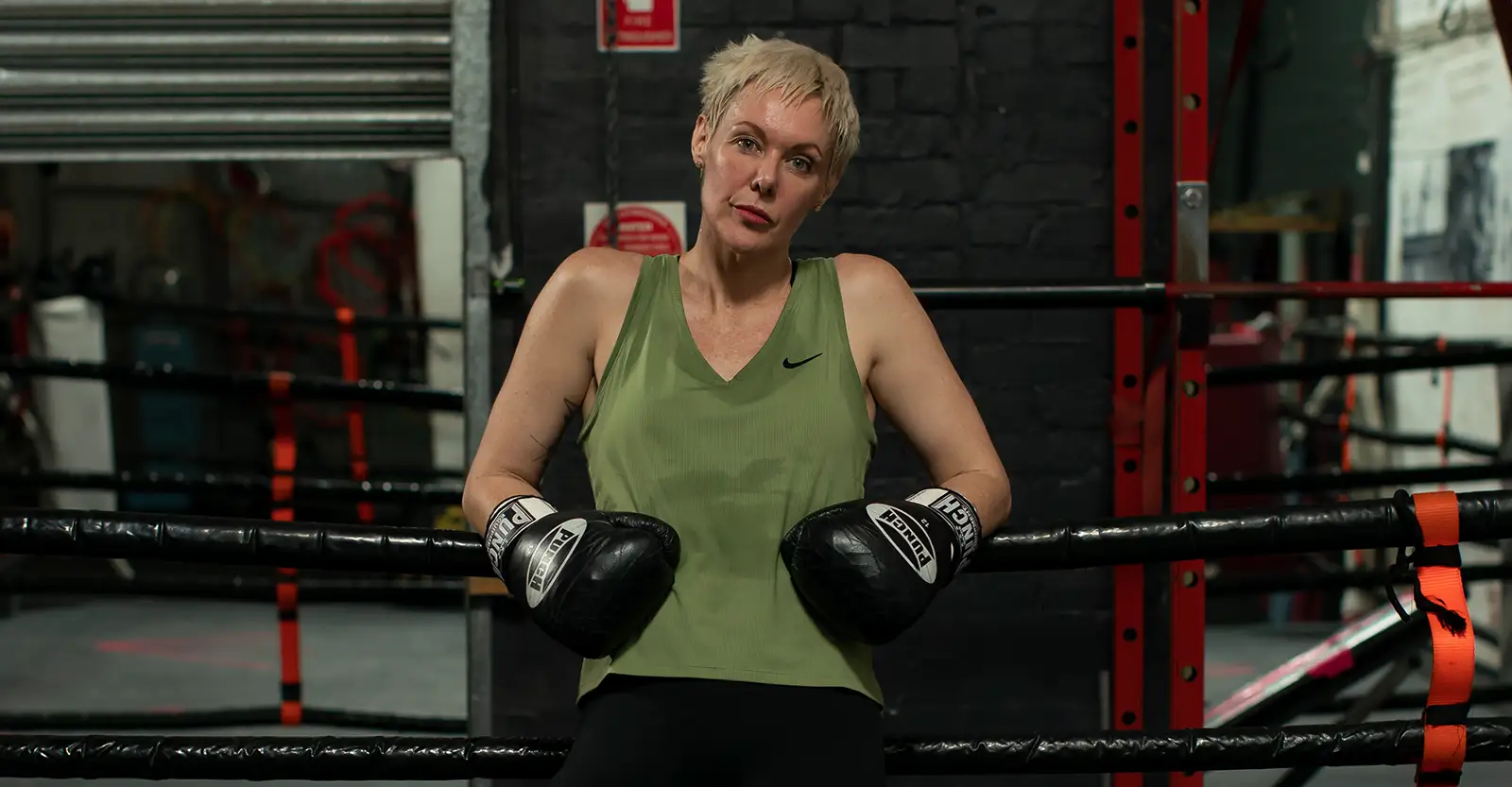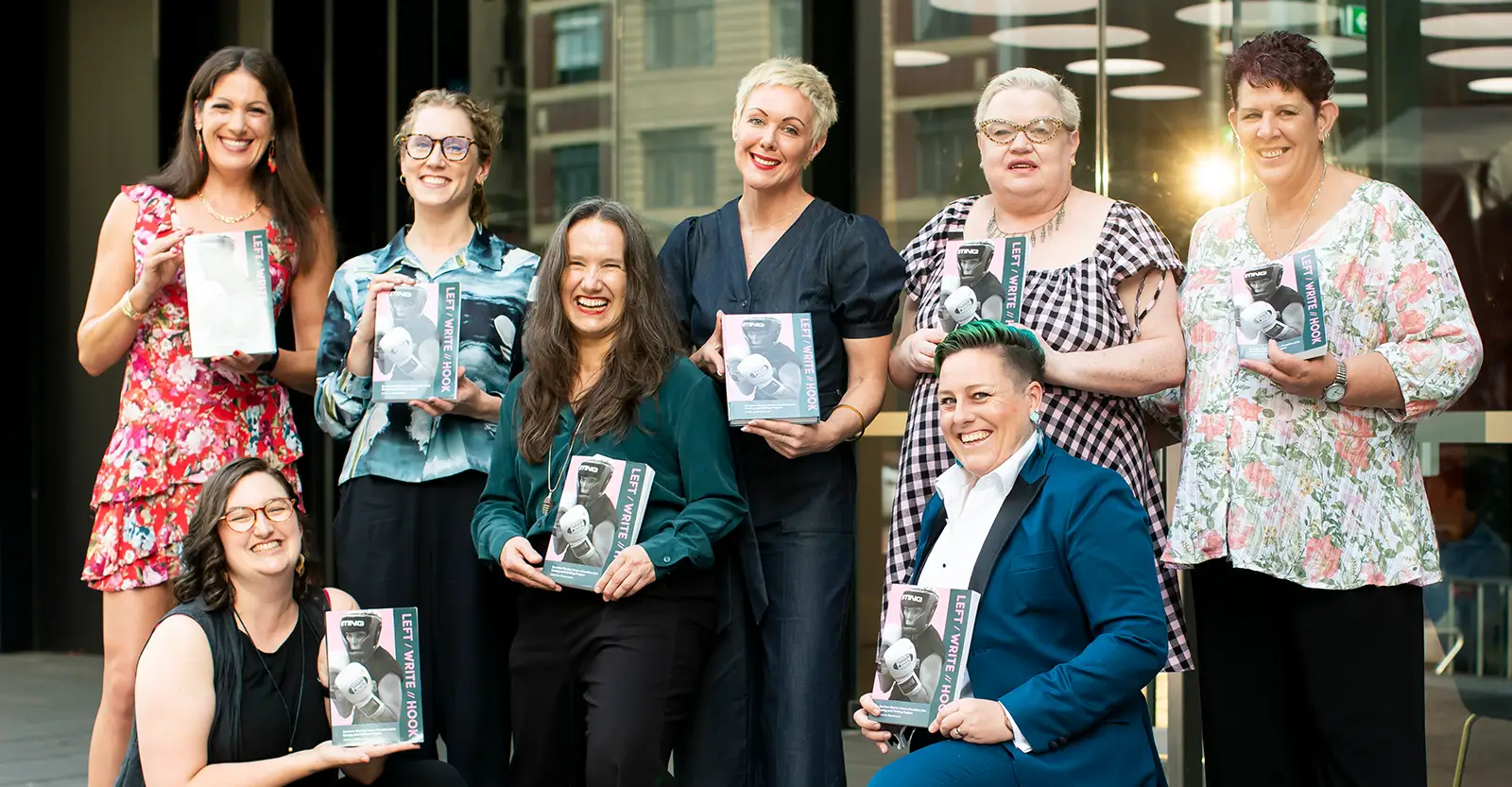In a desperate search for self, I embarked on a journey that radically transformed my life.
by Donna Lyon, PhD
Over the past five years, I’ve used my lived experience as a survivor of childhood sexual abuse, my stint in amateur boxing, and my professional identity as an academic and filmmaker to turn a grassroots project into a research initiative, a documentary, a book, and now a survivor-led charity. It’s a story of individual survivors coming together to heal. Along the way, we’ve partnered with the sector and philanthropy to co-create a movement that is making a powerful impact.

The beginning
It started in dysfunction — a childhood rooted in shame, secrecy, and abuse. I disconnected from my experiences. A memory, triggered at a party by a woman with her own devastating history of sexual abuse, changed my life forever. I was 25. It took six more years before I hit rock bottom. Crawling into recovery, I got sober, found a power greater than myself, and began to heal. A therapist helped me understand dissociation and complex trauma, and slowly, I rebuilt my life.
Employment at a University Film School gave me self-esteem. I enrolled in a PhD program and began making films again. Life improved, but a few years into recovery, I felt a simmering anger. I channelled it into a boxing bag, which eventually led me to amateur fighting. Despite more losses than wins, boxing gave me back confidence and strength. As Judith Herman says, “Trauma leaves you powerless.”
By the time I hung up my boxing boots I was at a stage of my recovery where I wanted to give back. I wanted to meet other adult survivors of child sexual abuse, share our stories, write, and then teach them the art of boxing. And so, a humble project, Left Write Hook, was born.
From grassroots to research
In 2019, I launched Left Write Hook at a local boxing gym in Ferntree Gully. A small story in the local paper and a Facebook ad brought nine survivors to the gym. That first Saturday, fear filled the room. Many participants had only disclosed their abuse to therapists or partners. Over eight weeks, their fear transformed into empowerment. There were noticeable shifts in how they understood their experiences.
As Bessel van der Kolk says, “Trauma is stored in the body.” Writing kept participants in a heavy, introspective state of memory, but boxing shifted those memories, giving them a physical outlet. The survivors began to release shame and express it on the boxing bag. “The bag can take it,” I oft reminded them.
I saw more potential in the project—perhaps a documentary and a book of writings. I pitched the idea to my colleague Dr Shannon Owen and after visiting a workshop, she was hooked.
The personal becomes political
In 2020, Shannon and I secured interdisciplinary seed research funding from the University of Melbourne. We collaborated with a psychologist and gender expert to measure the program’s effects on participants’ mental health. The results were promising; reduced PTSD, depression, and stress, along with increased agency, resilience, and belonging. In the research study, survivor-participants agreed to be part of a documentary film and book.
What began as an eight-week project turned into a two-year participatory arts journey. We worked with a core group of survivors, creatively re-imagining their stories through documentary filmmaking. The process became a way for survivors to process trauma within a collective narrative of empowerment. Participants wanted to advocate for awareness about child sexual abuse and let other survivors know they weren’t alone. The personal had become political.
Co-creating impact with philanthropy
As we raised funds for the documentary, the film’s social impact became clear. A member of the philanthropic community once asked, “What are you going to do when the film is released? People will want to do the Left Write Hook program.” They were right. I began laying the groundwork for a charity to run the flagship eight-week program: writing and trauma-informed boxing for survivors of child sexual abuse, led by those with lived experience.
In the last 18 months, we’ve raised over a quarter of a million dollars, run 10 programs, and impacted the lives of 68 survivors. We’ve also developed an online train-the-trainer program and trained 14 lived experience trainers. We’ve partnered with the University of Melbourne to conduct a randomised control trial, comparing a boxing-only model to Left Write Hook to help build our evidence-base.

The individual and the collective: transforming trauma
The documentary of Left Write Hook, supported by Minderoo Pictures, premiered at the Melbourne International Festival. The film was part of a ‘Premiere with Purpose’ event, hosted by Decjuba and Decjuba Foundation. A spotlight was shone on the dark subject matter of child sexual abuse. The survivors, once relegated into silence, secrecy and shame, were now being celebrated for their strength, vulnerability and courage. Yet our stories are just a few of many. Statistics show that more than one in three women and one in five boys have been sexually abused before the age of 18.
Left Write Hook offers audiences insight into the lifelong impacts of childhood sexual abuse and complex trauma. It shows that through individual and collective healing, survivors can reclaim their power through writing, boxing, and community. Our story of social impact grows each day. Together with survivors, philanthropy, and the community, we’re creating a movement where survivors reclaim their bodies, rewrite their stories, and release their trauma.
I often reflect on why Left Write Hook is so transformative and impactful. I think it’s because we work with the whole person—the body, mind, and community. Survivors reclaim their stories not in isolation, but in a group. We aren’t there to fix or diagnose; we’re there to witness, to listen, and to box. Through these processes, survivors develop a sense of agency. They take responsibility for their healing and begin to envision a more empowered future.
Left Write Hook
Left Write Hook is in cinemas from October 24, 2024 on a limited theatrical release. Visit https://leftwritehook.film/watch-the-film for screening information or request a screening via the website.
To find out more about the Left Write Hook charity and to support its work, visit www.leftwritehook.org.